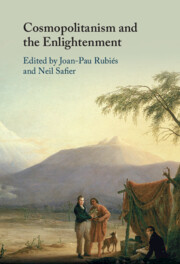Book contents
- Cosmopolitanism and the Enlightenment
- Cosmopolitanism and the Enlightenment
- Copyright page
- Dedication
- Contents
- Figures
- Contributors
- Preface
- Acknowledgments
- Introduction
- 1 Enlightenment Cosmopolitanism in Perspective
- 2 The Cosmopolitan Paradox
- 3 Diderot’s Conjectural History and the History of “Monstrous Nature”
- 4 Geographies of Cosmopolitanism
- 5 The Imperial, Global (Cosmopolitan) Dimensions of Nonelite Colonial Scribal Cultures in the Early Modern Iberian Atlantic
- 6 Gendered Cosmopolitanism?
- 7 Cosmopolitanism and the Creation of Patriotic Identities in the European Enlightenment
- 8 A Cosmopolitanism of Countervailing Powers
- 9 Cosmopolitanism and Civil War
- Afterword
- Index
7 - Cosmopolitanism and the Creation of Patriotic Identities in the European Enlightenment
The Case of Pietro Napoli Signorelli and His Storia critica de’ teatri antichi e moderni
Published online by Cambridge University Press: 16 March 2023
- Cosmopolitanism and the Enlightenment
- Cosmopolitanism and the Enlightenment
- Copyright page
- Dedication
- Contents
- Figures
- Contributors
- Preface
- Acknowledgments
- Introduction
- 1 Enlightenment Cosmopolitanism in Perspective
- 2 The Cosmopolitan Paradox
- 3 Diderot’s Conjectural History and the History of “Monstrous Nature”
- 4 Geographies of Cosmopolitanism
- 5 The Imperial, Global (Cosmopolitan) Dimensions of Nonelite Colonial Scribal Cultures in the Early Modern Iberian Atlantic
- 6 Gendered Cosmopolitanism?
- 7 Cosmopolitanism and the Creation of Patriotic Identities in the European Enlightenment
- 8 A Cosmopolitanism of Countervailing Powers
- 9 Cosmopolitanism and Civil War
- Afterword
- Index
Summary
This chapter focuses on the life and writings of Pietro Napoli Signorelli (1731–1815) and provides one way through which to map out the shifts and transformation of the cosmopolitan ideal in an age of growing patriotism. Napoli Signorelli wrote and lived between the intellectual and political worlds of two connected peripheries of Europe, Italy and Spain, and one of its intellectual centres, France. The Bourbon courts in Madrid and Naples provided the political thread for these debates and the Neoclassical tradition the background for them. The querelle between the ancients and moderns remained central, as writers searched within and outside of the Neoclassical tradition to stake their claims. Knowledge of the shared ground of the Neoclassical canon bound enlightenment writers together but also provided the fodder to drive them apart. Napoli Signorelli’s work and life illuminates a crisis or reconfiguration of cosmopolitanism, specifically at the end of the eighteenth century, when the Neoclassical underpinnings of cosmopolitanism were unsettled by emerging patriotic identities within Europe.
Keywords
- Type
- Chapter
- Information
- Cosmopolitanism and the Enlightenment , pp. 208 - 238Publisher: Cambridge University PressPrint publication year: 2023

